The Works of John Gill (19 vols.)
Digital Logos Edition
Overview
John Gill was one of the most influential Baptist thinkers and pastors of his day, and all of his writings are contained in this massive 19 volume collection. Known for his expository works on all of Scripture and for compiling a practical book of theology for his congregation, he is most famous for his passionate defense of Calvinism and the sovereignty of God in all situations. In Sermons and Tracts, vol. 3, Gill includes his famous essays, The Doctrine of the Trinity Stated and Vindicated and A Dissertation Concerning the Antiquity of the Hebrew Language, Letters, Vowel-Points, and Accents.
Gill’s writings helped to define and encourage Reformed Baptist thinking in the 18th century. Considered to be the first major Baptist scholar, Gill continues to shape modern Calvinism. Although modern scholars debate about Gill’s role as the father of Baptist hyper-Calvinism, it cannot be denied that at the very least, he was a forerunner to that tradition. During his lifetime, Gill and his church backed the preaching and ministry of George Whitefield. His work represents not only essential eighteenth-century biblical scholarship, but a turning point in Reformed theology.
Gill’s commentaries are still widely used today by laity and pastors, being theologically sound and practical for daily study. Gill makes the Scripture accessible and applicable to the everyday reader, believing that sound doctrine impacts daily life. Containing over 12,000 pages, The Works of John Gill is an essential resource for any student of the Scriptures and of Reformed thinking. Perfect for the general reader, professors, and Bible scholars, these 19 volumes will enlighten, encourage, and stimulate thinking and application. Gill’s writings include everything from exposition, commentary, essays, and a biography to help aid understanding of this prominent man of faith and his works. The Logos edition makes study easy by linking with every Scripture reference to the Bibles in your library.

- Commentaries, essays, and biography
- Contains a staggering 12,329 pages
- Includes two essays from Gill’s opponents
His doctrinal and practical writings will live, and be admired, and be a standing blessing to posterity, when their opposers are forgotten, or only remembered by the refutations he has given them. While true religion and sound learning have a single friend remaining [. . .], the works and name of Gill will be precious and revered.
For good, sound, massive, sober sense in commenting, who can excel Gill?
Taking its place among the truly famous theologies of this period, it deserves a niche in all representative collections of systems of theology. His mastery of ancient language and ancient writings, as well as of the Scriptures, is reflected not only in his theology but in his expositions.
—Professor John F. Walvoord, Dallas Theological Seminary
- Title: The Works of John Gill
- Authors: John Gill, Daniel Whitby, Anthony Collins, John Rippon, and Benjamin Francis
- Volumes: 19
- Pages: 12,329
- Christian Group: Reformed
- A Complete Body of Doctrinal and Practical Divinity, vol. 1
- A Complete Body of Doctrinal and Practical Divinity, vol. 2
- The Cause of God and Truth
- An Exposition of the New Testament, vol. 1
- An Exposition of the New Testament, vol. 2
- An Exposition of the New Testament, vol. 3
- An Exposition of the Old Testament, vol. 1
- An Exposition of the Old Testament, vol. 2
- An Exposition of the Old Testament, vol. 3
- An Exposition of the Old Testament, vol. 4
- An Exposition of the Old Testament, vol. 5
- An Exposition of the Old Testament, vol. 6
- An Exposition of the Book of Solomon’s Song; Commonly Called Canticles
- Sermons and Tracts, vol. 1
- Sermons and Tracts, vol. 2
- Sermons and Tracts, vol. 3
- A Brief Memoir of the Life and Writings of the Late Reverend John Gill
- A Discourse of the Grounds and Reasons of the Christian Religion
- Discourse on the Five Points
This title is included in the following collections
You can save when you purchase this product as part of a collection.
Logos 8 Baptist Gold Legacy Li...
$849.99$849.99Logos 8 Reformed Gold Legacy L...
$849.99$849.99Logos 7 Baptist Gold Legacy Li...
$849.99$849.99Logos 8 Baptist Platinum Legac...
$1,499.99$1,499.99
- $1,499.99
- $1,499.99
- $1,499.99
- $1,499.99
- $2,999.99$2,249.99
- $2,999.99
- $2,999.99
- $2,999.99
- $2,999.99
- $2,999.99
- $2,999.99
- $2,999.99
- $4,749.99$3,562.49
- $4,749.99
- $4,749.99
- $4,749.99
- $4,749.99
- $4,749.99
- $11,399.99
- $11,399.99
- $23,999.99$17,999.99
- $21,749.99
- $24,999.99
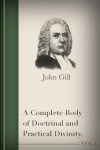
Seeing a need for knowledge of the Bible in his congregation, Gill wrote this comprehensive guide to practical doctrine. He begins with the very basics of faith, such as the existence of God, his nature, his characteristics, the Trinity, his involvement with humanity, and the person of Christ. Gill also covers creation, sin, corruption, and the nature of the soul. He expounds upon the covenant of grace, redemption, justification, sanctification, and judgment. Included is a detailed table of contents and an introduction to the works of John Gill.
Included Essays:
- Of the Being of a God
- Names of God
- Personal Relations in the Deity
- Of the Internal Acts and Works of God
- Of the Covenant of Grace
- Of Christ as the Mediator of the Covenant
- Of Creation in General
- Providence of God
- Of the Sin and Fall of Man
- Of the Corruption of Human Nature
- Manifestations and Administration of the Covenant of Grace
- Of the Law
- The Gospel
- Of the Incarnation of Christ
- His State of Humiliation
- His Resurrection
- Priestly Office
- Spiritual Reign
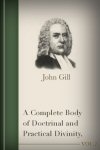
In this second volume of useful theology, Gill continues his exposition on essential doctrines. He writes in a conversational yet theologically sound style that is perfect for students and laity as well as Bible scholars. This volume of practical exposition focuses on personal and corporate worship, Christian attitudes, the nature of church and community, baptism, the place of singing in worship, the ordinance of elders and deacons, as well as a dissertation on proselytes in the Hebrew tradition. Together, the two volumes of A Complete Body of Practical Divinity present John Gill’s comprehensive doctrinal guide.
Included Essays:
- Of Redemption by Christ
- Propitiation, Atonement, and Reconciliation
- Of the Worship of God
- Of the Object of Worship
- Of the Fear of God
- Of Trust and Confidence in God
- Of Spiritual Joy
- Of Christian Fortitude
- Of Godly Sincerity
- Of the Nature of a Gospel Church
- Duties of Churches to Their Pastors
- Of the Office of Deacons
- Of Baptism
- Of Public Prayer
- Of Singing Psalms
- Duties of Husband and Wife
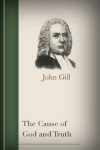
In this work, Gill examines the tenets of Calvinism, going over the doctrines, the Scriptures, and the historical figures associated with this controversial topic. Divided into four sections, Gill answers the objections to Calvinism raised by Dr. Whitby, a prominent Arminian scholar, whose arguments are included in this collection. He addresses reprobation, election, redemption, grace, predestination, and original sin. Gill also provides biographies of several theologians—such as Athanasius and Ignatius—and their stances on these doctrines.
Table of Contents
- Examination of Scripture Passages
- Of Reprobation
- Of Election
- Of Redemption
- Of Efficacious Grace
- Of the Corruption of Human Nature, and the Impotence of the Will of Man to that Which is Spiritually Good
- Of Perseverance
- Of the Presence and Providence of God
- The State and Case of the Heathens
- Of Predestination
- Of Original Sin
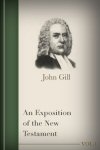
An Exposition of the New Testament, vol. 1
- Author: John Gill
- Publisher: William W. Woodward
- Publication Date: 1811
- Pages: 885
Throughout his life, Gill sought to encourage and educate his congregation on the truths of Scripture, and this exposition on the books of the New Testament is meant for just that purpose. Written in a comprehensible and theologically sound manner, this volume covers the first third of the New Testament. With both the expositions on the Old and New Testaments, there are 7,515 pages of commentary.
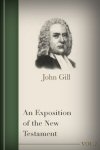
An Exposition of the New Testament, vol. 2
- Author: John Gill
- Publisher: William W. Woodward
- Publication Date: 1811
- Pages: 875
This is Gill’s second volume of interpretation on the New Testament and continues in the vein of thoughtful and concise exposition as the first volume.
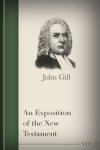
An Exposition of the New Testament, vol. 3
- Author: John Gill
- Publisher: William W. Woodward
- Publication Date: 1811
- Pages: 885
This volume concludes Gill’s expositional commentary on the New Testament. Written with the goal of practical application and the belief that sound doctrine influences daily life, Gill’s expositions will help every Christian make the Bible practical.

An Exposition of the Old Testament, vol. 1
- Author: John Gill
- Publisher: London
- Publication Date: 1748-1763
- Pages: 963
In the same style as his expositions on the New Testament, Gill provides helpful commentary and interpretation of the books of the Old Testament. His careful attention to theology and practicality will help the reader to understand and apply the Scriptures.

An Exposition of the Old Testament, vol. 2
- Author: John Gill
- Publisher: London
- Publication Date: 1748-1763
- Pages: 857
More of Gill’s expert exposition on the Old Testament is contained in this second volume.

An Exposition of the Old Testament, vol.3
- Author: John Gill
- Publisher: London
- Publication Date: 1748-1763
- Pages: 841
The third volume continues the interpretation and exposition of the Old Testament by Gill.

An Exposition of the Old Testament, vol. 4
- Author: John Gill
- Publisher: London
- Publication Date: 1748-1763
- Pages: 703
Gill presents more interpretation of the Old Testament, providing valuable information for laity and scholars alike.

An Exposition of the Old Testament, vol. 5
- Author: John Gill
- Publisher: London
- Publication Date: 1748-1763
- Pages: 757
Gill continues his exposition on the latter books of the Old Testament.

An Exposition of the Old Testament, vol. 6
- Author: John Gill
- Publisher: London
- Publication Date: 1748-1763
- Pages: 801
Gill wraps up his impressive expository commentary on the Old Testament in this sixth volume.
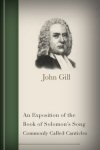
In this classic work, Gill discusses the Song of Solomon, arguing for a spiritual reading of the book with the Bride as the Bride of Christ and Christ as the Bridegroom. He sees this book as the story of Christ’s love for his Church, and though Gill brings up alternative interpretations, he ultimately seeks to defend the authority and validity of the spiritual reading. He examines each verse of the book, cross-referencing with other Scriptures. This clear and concise volume remains valuable for understanding and interpreting this poetic book of the Old Testament.
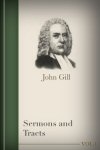
Gill was a pastor at Strict Baptist Church for over 50 years, and in this two volume set, his most memorable sermons and expositions are collected. Included in this first volume are his annual, occasional, and funeral sermons, as well as a biography of Gill.
Sermons Included
- The Watchman's Answer to the Question, "What of the Night?"
- The Practical Improvement of the Watchman's Answer
- The Glory of the Church in the Latter Day
- Faith in God and His Word, the Establishment and Prosperity of His People
- The Sure Performance of Prophecy
- The Glorious State of the Saints in Heaven
- The Agreement of the Old and the New Testament
- Twelve Occasional Sermons
- Christ a Priest after the Order of Melchizedek
- The Fulness of the Mediator
- Christ the Savior from the Temple
- The Law Established from the Gospel
- Neglect of Fervent Prayer Complained of
- The Doctrine of the Wheels
- The Necessity of Christ's Making Satisfaction for Sin, Proved and Confirmed
- The Quiet and Easy Passage of Christ's Purchased People through Death to Glory
- Sixteen Funeral Sermons
- The Free Grace of God Exulted in the Character of the Apostle Paul
- The Faithful Minister of Christ Crowned
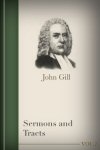
This second volume contains Gill’s ordinations and polemical sermons, as well as his dissertations on various Scriptures, some of which were not published until this 1773 edition.
Sermons Included
- A Sermon at the Ordination of the Rev. George Braithwaite
- A Sermon at the Ordination of Several Ministers
- A Sermon at the Ordination of the Reverend Mr. John Davis
- A Sermon at the Ordination of the Reverend Mr. John Reynolds
- Truth Defended: In Answer to a Pamphlet on the Supralapsarian Scheme
- An Answer to the Birmingham Dialogue–Writer, Part 1
- An Answer to the Birmingham Dialogue–Writer, Part 2
- The Moral Nature and Fitness of Things, Considered
- the Necessity of Good Works unto Salvation, Considered
- The Ancient Mode of Baptizing, Maintained and Vindicated
- A Defense of Ditto
- The Divine Right of Infant Baptism, Examined and Disproved
- The Argument from Apostolic Tradition
- Infant Baptism, an Innovation
- A Reply to a Defense of the Divine Right of Infant–Baptism
- The Scriptures the Only Guide in Matters of Religion
- Baptism a Divine Commandment
- Infant–Baptism, a Part and Pillar of Popery
- A Dissertation on the Eternal Sonship of Christ
- A Dissertation on the Rise and Progress of Popery
- Dying Thoughts
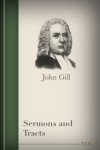
This final volume includes Gill’s sermons on the Trinity, the Resurrection, justification, the love of God, predestination, as well as essays on church guidance and planning. It also includes Gill's famous work on the Trinity: The Doctrine of the Trinity Stated and Vindicated, as well as A Dissertation Concerning the Antiquity of the Hebrew Language, Letters, Vowel-Points, and Accents.
Included Essays:
- The Doctrine of the Trinity, Stated and Vindicated
- The Doctrine of the Resurrection, Stated and Defended
- The Doctrine of Justification, Stated and Maintained
- The Doctrines of God's Everlasting Love to His Elect, and their Eternal Union with Christ, with Other Truths, Stated and Defended, Against Dr. Taylor
- The Doctrine of the Saints Final Perseverance, Asserted and Vindicated
- The Doctrine of Predestination Stated and Set in a Scripture Light, Against Mr. Wesley
- The Prophecies of the Old Testament, Respecting the Messiah, Proved to be Literally Fulfilled in Jesus
- A Dissertation Concerning the Antiquity of the Hebrew Language, Letters, Vowel-Points, and Accents
- Two Annual Discourses on the Duty of Prayer and Singing of Psalms
- An Essay on the Original of Funeral Sermons, Orations, and Odes
- A Brief Confession of Faith and Practice, Read and Assented to at the Admission of Members into the Church
- A Declaration of the Faith and Practice of the Church of Christ

John Gill was an inspiration to his congregation and his fellow clergyman, and John Rippon presents a compelling biography of this influential preacher and theologian. He gives an account of Gill’s life as well as a summary of his considerable writings. Rippon also includes the elegy delivered at Gill’s funeral by Benjamin Francis.
John Rippon was born in 1751 in England. He was an English Baptist clergyman and when Gill died in 1771, Rippon took over his church. He is most famous for publishing a hymnal entitled A Selection of Hymns from the Best Authors. He died in 1836.
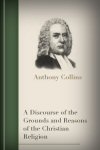
Deist thinker Anthony Collins’ treatise on reason and free-thinking caused a theological and philosophical commotion when it was first published in 1724. Promoting reason as a valid way to determine truth, Collins criticizes all churches for not legitimatizing critical thinking. John Gill wrote The Prophecies of the Old Testament in response to Collin’s arguments. This edition features the 1724 printing.
Anthony Collins was born in 1676 in England. He was a Deist philosopher and died in 1729.

In 1710, clergyman Daniel Whitby published this treatise defending the principles of Arminianism. It elicited a response from John Gill, his The Cause of God and Truth, as well as from Jonathan Edwards, with Freedom of the Will.
Daniel Whitby was born in 1638 and became an Arminian minister and theologian. Famous for his defense of Arminianism, Whitby was one of the first theologians and pastors to promote postmillennialism. He died in 1726.
John Gill was born in 1697 in England. A Baptist clergyman, Gill was also a biblical scholar, learning Latin and Greek by age 11. He was also a fervent Reformed thinker, holding to the Five Points of Calvinism. Gill is considered by many to be the father of hyper-Calvinism. He was a preacher at the Strict Baptist Church for fifty–one years, which later became the Metropolitan Tabernacle, pastorate of Charles Spurgeon. Because of his considerable scholarship, Gill was given an honorary doctorate by the University of Aberdeen in 1748. He is most known for being the author of definitive academic works, including, The Doctrine of the Trinity Stated and Vindicated, The Cause of God and Truth, and A Body of Doctrinal Divinity, all of which are included in this collection. Gill died in 1771.
Reviews
20 ratings
Phil Niebergall
1/10/2020
Vernon Owens
9/29/2018

Daniel Caballero
7/30/2018
Leonardo
4/27/2018

Dr. Bill Barrick
9/2/2017
KYU SUNG KANG
7/20/2017
Allan Story
5/5/2017
James
3/19/2016
Brian Harris
3/12/2016

Caleb Kolstad
7/6/2015